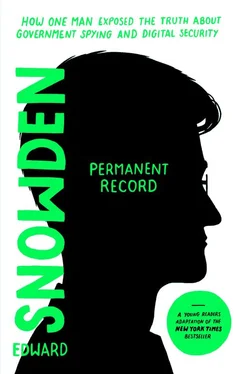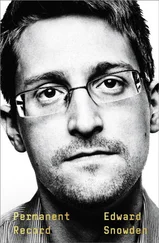Edward Snowden
PERMANENT RECORD
Young Readers Edition
HOW ONE MAN EXPOSED THE TRUTH ABOUT GOVERNMENT SPYING AND DIGITAL SECURITY
The Fourth Amendment to the US Constitution protects people and their property from government scrutiny. It states: The right of the people to be secure in their persons, houses, papers, and effects, against unreasonable searches and seizures, shall not be violated, and no Warrants shall issue, but upon probable cause, supported by Oath or affirmation, and particularly describing the place to be searched, and the persons or things to be seized.
Translation: If officers of the law want to go rooting through your life, they first have to go before a judge and explain why. They have to establish that they have reason to believe that you might have committed a specific crime, or that they believe specific evidence of a specific crime might be found on or in a specific part of your property. They have to swear that this reason has been given honestly and in good faith.
Only if the judge approves a warrant will they be allowed to go searching—and even then, only for a limited time.
The Constitution was written in the eighteenth century, back before computers were invented. It stands to reason that computer files, whatever their contents, are our version of the Constitution’s “papers.” Data, meanwhile, is our version of “effects,” a catchall term for all the stuff that we own, produce, sell, and buy online.
In the centuries since the original Constitution Day, our clouds, computers, and phones have become our homes, just as personal and intimate as our actual houses nowadays. If you don’t agree, then answer me this: Would you rather let your friends hang out in your bedroom alone for an hour, or let them spend even just ten minutes alone with your unlocked phone?
My name is Edward Joseph Snowden. I used to work for the United States government, but now I work for you, the public. It took me nearly three decades to recognize that there was a distinction. I spend my time trying to protect the public from the person I used to be—a spy for the Central Intelligence Agency (CIA) and National Security Agency (NSA).
The reason you’re reading this book is that I did a dangerous thing for a man in my position: I decided to tell the truth about my country’s secret regime of mass surveillance. A system of near-universal surveillance had been set up not just without the American public’s consent, but in a way that deliberately hid every aspect of its programs from our knowledge. In other words, the government sworn to protect its citizens was also spying on them.
When the program was first created—when I helped build it—I didn’t realize that engineering a system that would keep a permanent record of everyone’s life would turn out to be a tragic mistake. But over time, I came to understand that American citizens were being surveilled in a way that went against not just the Constitution of the United States, but the basic values of any free society. The public had never been granted a chance to voice our opinion about this surveillance.
I love my country, and I believe in public service—my whole family, my whole family line for centuries, is filled with men and women who have spent their lives serving this country and its citizens. I had sworn an oath of service to the public, in support and defense of the Constitution, whose guarantee of civil liberties had been blatantly violated. I realized that coming forward and disclosing the extent of my country’s abuses was critical. I therefore decided to become what’s known as a whistleblower.
In 2013, I collected internal Intelligence Community documents that gave evidence of the US government’s lawbreaking and turned them over to journalists, who vetted and published them. In doing so, I knew I could—and would—be charged with crimes by the US government under the Espionage Act. The penalty for disclosing top secret documents, whether to foreign spies or domestic journalists, is up to ten years imprisonment per document. As a result, I have lived in exile in Moscow, Russia, a country I did not choose, for more than seven years.
This book is about what led up to that decision, the moral and ethical principles that informed it, and the impact that mass surveillance and data collection continues to have on all of us.
It’s also about my life.
ONE
Looking Through the Window
The first thing I ever hacked was bedtime.
When I was young, it always felt unfair that my parents forced me to go to sleep before they or my sister did. I wasn’t even tired. Life’s first little injustice.
Many nights of the first several years of my life ended in civil disobedience: crying, begging, bargaining. Until the night I turned six and discovered direct action.
I had just had one of the best days of my life, complete with friends, a party, and gifts, and I wasn’t about to let it end. So I went about covertly resetting all the clocks in the house by several hours, trying to trick my parents into thinking it was earlier in the evening.
When the authorities—my parents—failed to notice, I was mad with power, galloping laps around the living room. I, the master of time, would never again be sent to bed. I was free.
I fell asleep on the floor, having finally seen the sunset on June 21, the summer solstice, the longest day of the year. But when I awoke, the clocks in the house once again matched my father’s watch.
If you’re like most people these days, you set your watch, if you wear one, to the time on your smartphone. But if you look at your phone, and I mean really look at it, burrowing deep through its menus into its settings, you’ll eventually see that the phone’s time is “automatically set.” Every so often, your phone quietly—silently—asks your service provider’s network, “Hey, do you have the time?” That network, in turn, asks a bigger network, which asks an even bigger network, and so on through a great succession of towers and wires until the request reaches one of the true masters of time, a network time server run by the atomic clocks kept at places like the National Institute of Standards and Technology in the United States, the Federal Office of Meteorology and Climatology in Switzerland, and the National Institute of Information and Communications Technology in Japan. That long invisible journey, accomplished in a fraction of a second, is why you don’t see a blinking 12:00 on your phone’s screen every time you power it up again after its battery runs out.
I was born in 1983, at the end of the era in which people set the time for themselves. That was the year that the US Department of Defense created a computer network for the public called the internet. This virtual space gave rise to the Domain Name System that we still use today—the .govs, .mils, .edus, and, of course, .coms. And yet it would be another six years before the World Wide Web was invented, and about nine years before my family got a computer with a modem that could connect to it.
Of course, the internet is not a single entity, although we tend to refer to it as if it were. I’m going to use the term in its broadest sense, to mean the universal network of networks connecting the majority of the world’s computers to one another via a set of shared protocols.
Читать дальше














